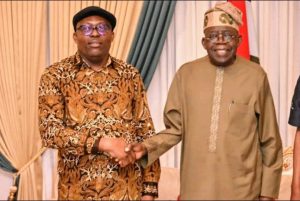

By Dada Ahmed.

(Picture)R-L: President Bola Ahmed Tinubu & Governor Sim Fubaram
Thursday, September 18, 2025, will remain etched in the memory of the people of Rivers State as the day Sir Siminalayi Fubara returned fully as the democratically elected governor. The lifting of the state of emergency, declared six months earlier, closed a turbulent chapter in the state’s political journey. But beyond the jubilation lies a deeper call for reflection: what lessons can politicians across Nigeria draw from this episode?
The state of emergency in Rivers was the culmination of months of escalating political tension between rival power blocs within the state’s ruling elite. At the heart of the crisis was the bitter fallout between Governor Fubara and entrenched political interests, who saw his rising independence as a threat to their dominance. The confrontation quickly spilled into the legislature, the judiciary, and even the streets, leaving governance paralysed and citizens worried.
The confrontation was marked by attempts to impeach the governor, mass protests, violent clashes among supporters, and institutional breakdowns. As the situation degenerated, the fear of Rivers slipping into anarchy became a reality. Security reports warned of looming chaos, prompting Abuja to weigh drastic options.
When the Federal Government eventually declared a state of emergency, it justified the decision as the only way to prevent bloodshed and restore order. For ordinary Rivers people, however, the intervention was both a relief and a bitter reminder of how political elites often gamble with the lives of citizens in pursuit of power.
On September 17, 2025, President Bola Ahmed Tinubu addressed the nation, announcing the cessation of the emergency rule. In his carefully worded broadcast, the president acknowledged the resilience of Rivers people and emphasised that democracy thrives only when the will of the people is respected. He underlined that Sir Siminalayi Fubara, as the duly elected governor, must be allowed to serve without undue interference.
He appealed to politicians to embrace dialogue, tolerance, and respect for institutions rather than resorting to violence or imposition. His words struck a chord, both as a warning and as a roadmap to prevent future breakdowns.
The Rivers debacle offers a sobering lesson: political intolerance is a danger not only to states but to the stability of the entire federation. Politicians must learn that governance is not a zero-sum game where one group must completely annihilate the other. Instead, it should be about building consensus and serving the people.
Another lesson is the importance of strengthening institutions. The Rivers crisis escalated because institutions that should have mediated,such as the legislature and judiciary,were dragged into partisan battles. Politicians must resist the temptation to turn state institutions into personal weapons of political warfare.
Respect for mandates is equally crucial. Once elections are concluded and results declared, the focus should shift to governance, not endless schemes to undermine the victor. Politicians should understand that power belongs ultimately to the people, and any attempt to subvert it undermines democracy.
The federal government should evolve proactive engagement and mediation among members of political class, beyond declaration of the state of emergency while its principles must guide Abuja’s relationship with states facing political crises.
The Rivers episode also underlines the danger of godfatherism in Nigerian politics. When political benefactors insist on dictating to their successors, friction is inevitable. Politicians must allow elected leaders the space to govern in line with their mandate, not as puppets on strings.
Civic education remains another takeaway. Citizens must understand their role in holding leaders accountable, resisting manipulation, and rejecting violence. Political analysts argued that while the Rivers people showed resilience during the emergency, more vigilance is needed to prevent politicians from weaponising ethnic and partisan sentiments.
There is also a moral lesson in the sense that political power is transient, but the scars of misused power endure. Politicians must learn more about the culture of humility, remembering that their legacy will be judged not by the battles they win against rivals but by the lives they improve.
It must be stressed that Nigeria needs enhanced institutionalized mechanisms for early conflict resolution. Dialogue platforms, intra-party dispute systems, and non-partisan arbitration panels should be empowered to resolve disputes before they spiral into national emergencies.
The Rivers State crisis and its resolution are a stark reminder that democracy is fragile when politicians place personal ambition above collective stability. September 18, 2025, should not only be remembered as Governor Fubara’s restoration day but also as the day Nigeria recommitted itself to avoiding the politics of brinkmanship.
Concerned Nigerians strongly believe that if politicians absorb these lessons, Nigeria can strengthen its democracy and spare its citizens the trauma of watching their states descend into chaos. If ignored, Rivers may not be the last to walk this dangerous path.
Ahmed,one time head of the News Agency of Nigeria in Kogi state, publishes The Reporters.
ahmeddada008@gmail.com.


